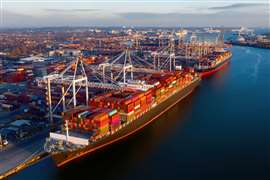FIEC highlights distortive foreign subsidies
26 January 2022
EC proposal for regulation on foreign subsidies ‘will impact construction’
The European Construction Industry Federation (FIEC) has highlighted concerns over what it calls the “distortive effects that foreign subsidies, in their various forms, potentially have on the EU internal market”.
 Picture courtesy Adobe Stock Images
Picture courtesy Adobe Stock Images
Last year, the European Commission proposed a new legislative instrument aimed at addressing the issue.
FIEC says that, despite several cases in recent years where foreign subsidies have been found to have distorting effects on sectors like construction, no specific EU legislation that allows for the scrutiny of state aid granted by non-EU countries is as yet in place.
As such, the Commission’s proposal represents a major step and a welcome one, towards restoring a level playing field in a sector like construction.
Increased market presence of state-owned companies
In recent years, there has been an increase in the number of cases involving third country companies bidding for construction projects of all sizes across the entire EU.
A major concern is the increased market presence of state-owned companies, in particular from China. These state-owned companies benefit from a captive domestic market and easy access to funds from national policy banks.
As a result, when bidding for construction projects, these companies are able to offer tenders at prices that no privately owned competitors can afford. A very prominent example is the successful bid of a Chinese consortium for the Pelješac Bridge project in Croatia.
These cases are possible because the loophole which allows for foreign subsidies to go unchecked has not yet been effectively addressed.
The three tools
In order to fill this legislative gap, the Commission proposed an instrument that introduces three tools that will enable it to investigate financial contributions granted by public authorities of non-EU countries to companies engaging in an economic activity in the EU.
More specifically, the proposal provides for two notification-based tools – one concerning cases of concentrations and the other concerning public procurement procedures – in addition to an ex-officio review tool for all other market situations.
Nevertheless, there appears to be room for an additional tool: market investigations. The proposal enables the Commission to conduct sector-specific investigations but, disappointingly, this might only lead to a report.
This would not effectively address those problems privately-owned construction companies have been facing recently due to the existence of foreign subsidies in their market.
It would be beneficial to strengthen provisions related to these investigations.
Gurantees missing in general market tool
The proposal also gives the Commission the power to examine information from any source regarding alleged distortive foreign subsidies at its discretion.
As such, it can conduct either a preliminary review or a full investigation. The investigative powers the instrument would grant the Commission would enable it to carry out on-site inspections either in an EU Member State or even in a third country.
However, the proposed tool falls short in a couple of aspects. It does not guarantee that the Commission will act if sufficient evidence is provided, nor does it outline the procedure to be followed by interested parties, such as contractors, to request a review.
This threatens to undermine the effectiveness of the instrument.
How will distortions be redressed?
Where the Commission acts, it should consider whether the negative effects of a foreign subsidy on the economic activity in question outweigh the positive effects and may impose redressive measures or accept commitments if that is the case.
Several redressive measures are foreseen in the proposal. However, they seem insufficient when applied to certain scenarios that occur in the construction sector.
When it comes to the procurement market, the effectiveness of the instrument can only be guaranteed if it leads to the exclusion from future procurement procedures.
Other measures would still allow for a subsidized third country company to be awarded a contract for a construction project as it would still be able to propose a more “competitive” tender.
Procurement: several cases under the radar
When it comes to concentrations and bids in procurement, the proposed instrument involves a notification-based system of cases but only for the biggest and the most distortive ones.
For public procurement, only cases where the estimated value of the procurement is at least €250 million fall under the scope of the Commission’s proposal.
The proposed threshold has not been well received by stakeholders across various sectors, including construction.
Indeed, an overview of the number of construction projects either bid for or won by third country companies in the European procurement market suggests that a significant percentage of cases would slip under radar should the proposed threshold be put in place.
As such, the thresholds should be reconsidered.
Bans on subsidised bids
According to the proposal, the Commission would be able to apply fines and periodic penalty payments can be applied by the Commission when notifications contain incorrect or incomplete information, or, when an undertaking fails to notify a financial contribution in the context of a merger or public procurement procedure.
Additionally, for notifiable cases, the Commission should have the power to ban the award of public procurement contracts to subsidised bidders.
What does it mean for construction?
The proposed regulation on distortive foreign subsidies comes not a moment too soon. It should fill a regulatory gap in the single market as, at the moment, the strict EU rules on state aid do not apply to third country companies.
In recent years, European construction companies have lost out on major construction projects to non-EU companies, particularly State-owned companies, offering more “competitive” bids which would not have been possible without a foreign subsidy.







